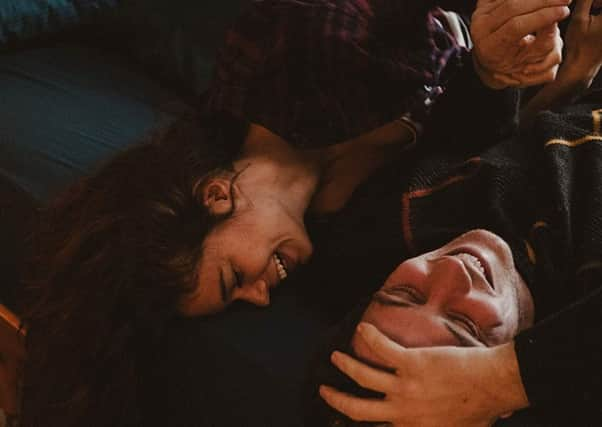Film reviews: Only You | Midsommar | The Dead Don’t Die | The Brink | Pavarotti | Stuber


Only You (15) ****
Midsommar (18) *****
The Dead Don’t Die (15) ****
The Brink (15) ****
Pavarotti (12A) ***
Stuber (15) *
Biology gets in the way of chemistry in the Glasgow-set Only You, a grown-up drama about a young couple whose relationship is tested by their struggle to conceive. Made with the kind of intimacy and emotional honesty found in the work of contemporary British auteurs such as Andrew Haigh (45 Years) and Joanna Hogg (Unrelated), this debut feature from Harry Wootliff sees her make good on the promise of some award-winning shorts with a film that isn’t afraid to tackle some of the taboos surrounding fertility in honest and heartfelt ways.
These play out in the story of Spanish arts worker Elena (Laia Costa) and PhD student Jake (The Durrells’ Josh O’Connor), who meet by chance on Hogmanay, fall instantly for one another, then find their relationship hitting some hurdles after Jake’s suggestion they try for a baby starts to overwhelm what they have. Wootliff is careful not to make the age difference between them too much of an issue (Costa’s character is a few years older than O’Connor’s); instead she focuses on making her characters feel as emotionally raw and truthful as possible – whether they’re falling for each other or confronting the ways in which reality impacts on the future they’ve imagined for themselves.
Advertisement
Hide AdMidsommar wasn’t screened for Scottish press last week in time for its release, which is a shame — and not just because of the debt Ari Aster’s follow-up to Hereditary owes The Wicker Man. It’s a fabulously freaky cult-themed horror wig-out in its own right. As he proved with Hereditary’s most shocking moments, Aster is a master not just of creating and sustaining dread, but of lingering in the distressing territory of a traumatic event moments after the worst has happened. One such event occurs early in Midsommar when graduate student Dani (Florence Pugh) receives tragic news about her bipolar sister – news that exacerbates her already needy relationship with her too-passive boyfriend, Christian (Jack Reynor).
As we cut to six months later, we see this tragedy has kept their relationship going past what should have been its natural endpoint and when Dani joins Christian and his buddies (all anthropology PhD candidates) on a summer field trip to Sweden in order to experience and study a rare folkloric tradition in the commune where their mutual friend Pelle grew up, that relationship rockiness stars manifesting itself in all kinds of twisted ways. Things gets pretty trippy pretty fast, with Aster making the most of the daylight setting to subvert the expected shocks and twists in audacious, sometimes jaw-dropping fashion.
It makes sense that Jim Jarmusch would make a zombie apocalypse movie. The laconic nature of his films and his characters’ off-kilter perspectives feel like natural fits for a sub-genre built around hordes of shuffling flesh-eaters. Having already flirted with horror in his arch vampire movie Only Lovers Left Alive, he further deconstructs the genre (and his own career) with The Dead Don’t Die, a droll, self-reflexive, fourth-wall-breaking comedy about a sleepy small town called Centerville that comes under siege from the walking dead after something called “polar fracking” throws the Earth off its axis. As the local cops bemused to find themselves dealing with the end of the world, Bill Murray and Adam Driver feel like sly surrogates for a filmmaker now operating in a world that’s far weirder than anything he’s ever created.
Proof of that comes in The Brink, a disturbing, fly-on-the-wall documentary about Steve Bannon, the genial-on-the-surface mastermind of Donald Trump’s 2016 presidential election victory. Directed by Alison Klayman (Ai Weiwei: Never Sorry), the film tracks his post-White House efforts to create a new world order by attempting to organise a cabal of craven power-mongers to better aid the implementation of his “unified Populist agenda”.
The usual phalanx of paranoid, pearl-clutching, alt-right publicity hounds pop up at frequent intervals, hoping to hang on to Bannon’s dual shirt tails as he sets out to drag the world down to his own deplorable level (“What would Leni Reifenstahl do?” is a question he actually asks himself on camera as he’s editing a self-styled propaganda film to boost support for Trump). As depressing as it is to see Bannon’s apparent success in transforming the mainstream media’s obsession with him and his ilk into headlines he knows will serve his cause, the film also exposes his straw-man constitution when properly interrogated.
The Ron Howard-directed Pavarotti is a conventional, yet effective, exploration of the late Italian opera singer’s life and times. His humble Italian origins, his remarkable technical ability, his global superstardom in the wake of the Three Tenors concert are all covered in timely fashion.
Advertisement
Hide AdAs is the scandalous (at the time) breakdown of his marriage. The film shows how Luciano Pavarotti’s humanity and fallibility helped make him the singer he was, if not quite the family man he wanted to be.
A throw-back to the sort of mismatched buddy cop films that were ten-a-penny in the 1990s, Stuber fails on the chemistry front, the joke front and the action front, leaving only a generic plot about a temporarily blinded cop (Dave Batista) press-ganging a cab driver (The Big Sick’s Kumail Nanjiani) into helping him take down the drug syndicate responsible for killing his partner.
The rampant product placement for the app-based driver service Nanjiani’s character works for is so blatant it even forms part of the title. A new low in every respect. ■